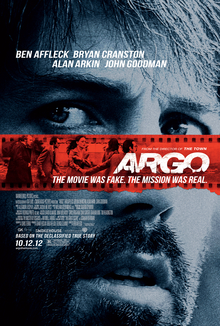Argo, directed by Ben Affleck
by Paul D. Miller
No wonder Hollywood loves Argo. It is a movie about how movies save the day.
Argo has already won Best Picture at the Golden Globes, the Producers Guild, the BAFTAs, and the Critic’s Choice–and probably the Oscars, by the time you read this. All for good reason: it is an excellent film–funny, suspenseful, intelligent, and thrilling in fine balance. But is it really better than Lincoln and Zero Dark Thirty?

Hollywood seems to think so, by the accolades and awards heaped upon it. But that should be no surprise. Hollywood famously loves movies about movies–from All About Eve (Best Picture, 1950) to The Artist (Best Picture, 2011), Hollywood has had a decades-long love affair with itself.
Argo tells a dramatized version of the true story of how the U.S. engineered the rescue of six Americans trapped in Tehran in 1979. An angry mob stormed the U.S. Embassy there and held dozens of American officials hostage for more than a year, an event that was in large part responsible for bringing down Jimmy Carter’s presidency. But six Americans slipped out and hid for months in Tehran.
How is this a movie about movies? You can’t make this stuff up: the six were eventually rescued by pretending to be a Canadian film crew scouting locations for a futuristic science fiction movie. The movie shows Hollywood big-wigs setting up a real production office, buying options to a real script, and holding a publicized reading to create a plausible cover story. An American official sneaks into Tehran, gives the hideaways their roles, the script, and fake identities. They brazenly play their parts and literally walk into the Tehran airport and fly out on a commercial flight– hiding in plain sight.
It’s an amazing movie because it is based on a true story. If it weren’t, the movie would be contrived and implausible. Much of the fun of watching Argo is in thinking the whole time “There’s no way they got away with this!” (But take a moment to browse wikipedia’s list of historical inaccuracies). The movie is also very funny, in a bleak way. At one point one officials asks incredulously “You don’t have any better bad ideas than this?” Another replies, “This is the best bad idea we have. By far.”
Near the end the movie explicitly draws some moral lessons from the experience. There is an epilogue followed by a voice-over by Jimmy Carter during the credits, both of which sing the praises of international cooperation (Canada provided crucial assistance throughout the mission) and herald the fact that the rescue was accomplished peacefully. These are fine and salutary lessons. The movie also suggests, naively, that movies are a globally unifying cultural force that bring people together and help us overcome conflict.
That, I think, explains why the movie has been so much more warmly received by Hollywood than Zero Dark Thirty. As I discussed in my earlier review, Zero Dark Thirty is a morally ambiguous film, one that shows the heartache, difficulty, frustration, and failure that typically accompany great endeavors. Some critics have accused it (unfairly, I think) of being “pro-torture,” and, like lots of war movies, it makes the U.S. military look cool. It does not sing the praises of international cooperation and peace. Argo is the opposite. It is a classic fairy-tale complete with moral simplicity and a Hollywood ending (a fairy-tale with tons of profanity).
I don’t mean to detract from Argo. It is a fun, well-executed, entertaining movie. But I do think Zero Dark Thirty is probably destined to be shunned and underappreciated this year. It was awarded Best Picture by the film critics of Austin, Boston, Chicago, New York, Washington, D.C., and San Francisco last December, before the torture controversy started–after which it has won almost nothing from anyone. A recent poll of more than 100 film critics found that they overwhelmingly believe Argo will win Best Picture at the Oscars–but more than three times as many believed Zero Dark Thirty was more deserving.
They are both based on true stories, and thus both have lessons about international affairs. They needn’t be in competition with each other–except when they are both nominated in the category in the same year. Argo will probably win the Oscar, but I suspect Zero Dark Thirty, as the more adult movie, will grow in stature in future years, while Argo will diminish.












